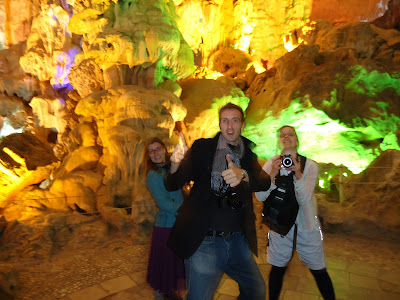

She was an artist, and I liked to pretend I was an artist and we both had little else going on love-wise, so it seemed an acceptable level of risk to declare ourselves married on facebook as an artistic statement, the proposal having stemmed from an offer to be models in a bridal show for a Taiwanese wedding planner. The Mandarin word for “model” sounds like “mah-tuh.”
She told me that a trick she would play on her students when she was trying to get them to quiet down was to ask them to read her lips. “But we don't know how to read lips!” they replied.
“Here, I'll teach you.” (mouths silently the word “hello”).
“Oh! I know! You said 'hello!'”
“Yes, that's right. Now what am I saying?” (mouths silently the words “my name is Melissa”).
“Oh, oh! You said 'my name is Melissa!'”
“Yes, now what am I saying?” (mouths slowly and deliberately the phrase “I love you” taking care to feel each morsel-syllable as it moves across the quiet tongue silently forward to the lips).
(every student goes crazy) “I love you!”
“Noooo Silly! El-e-phant shoe!” (laughter). Not withstanding the fact that elephants don't wear shoes and that it makes no sense to say “elephant shoe” to someone, I wondered if whether I would have the strength and conviction to say “I do” when the time came, if it ever came. Maybe I would just say nothing with “lips [that] began to move, forming soundless words” to quote Salinger out of context.
The Taiwanese wedding planner told me that in a tuxedo I looked like Jude Law. He pronounced it “jew-duh luh.” The cameras flashed and people spoke words we didn't understand, while we spoke words which they probably didn't understand.
I thought of how funny it would be as performance art to declare my marriage on facebook, complete with photographic evidence of bride and wedding gown. But somehow picturing the comments from ex-girlfriends and my mother dissuaded me a little from the committing the hoax, though the message I would convey would be nonetheless important. We always hurt the ones we love.
As a kid I was told repeatedly the story of the boy who cried “wolf.” But somehow I never grasped the moral, thinking that if I cried “wolf” loud enough, that it would have the power of incantation, that it would become true. With lips that continued to move.
Probably he would suffer the loudest would be my father whose amusement at repeating such aphorisms as Mencken's “marriage is an institution. But I'm not ready for an institution” or Oscar Wilde's “the proper basis for a marriage is a mutual misunderstanding” has always been akin to that of a child playing with a favorite toy. By getting married, to my brother I would have effectively died.
We filed languidly between rows of enamored onlookers to the melody of “Ave Maria” or something, and I was convinced momentarily, and the spell lasted throughout the photo shoot that ensued. All because of a song.
I thought of a conversation I had with my mother. She said “so I spent the day with David and Shannon.”
“Who are they?” I asked.
“Well, they're my adopted Grand-kids, since I know that I'll never have any of my own!” She laughed, but it was a laugh that betrayed a certain earnest longing, which she has been enthusiastically expressing since I hit puberty. I wondered whether I could fake this on facebook too.
It's a funny thing, the way we know each other but don't know each other. This postmodern paradox that we are continually “in touch” with pictures and newsfeeds available at the push of a button, but authentic living has gone to seed on the sacrificial altar of personal advertisement, the facebook page that proclaims what Freud described as the separate “selves” of who we are versus who we want others to think we are.
In a departure from Freudian psychology, Jacques Lacan theorized that our “unconscious” is structured like a language, and that the self of “who am I?” versus the self of “who do I want others to think I am?” could be perceived as the difference between “I love you” and “elephant shoes.”
The Taiwanese wedding planner was proud of how the show went, and was effusive with his praise of his “mah-tuh(s).” He even shared a rather personal tale, telling us that his father had withheld words of praise almost his entire life, but on that night had told his son that he was proud of him. To over-praise an underling, in Taiwanese society, constitutes a loss of face, albeit a useful one.

In looking at the images from that day alone in my bachelor's den, a month after my performance art marriage, I lingered on a few images, momentarily convinced of the magic incantation. I closed the computer's screen on itself and sat down with a book in a dimly lit corner. I felt the apartment start to shake--just a tiny earthquake, one of many.


 Winston Churchill once wrote that "there is nothing more exhilarating than to be shot at without result." This was possibly said at a time when Britain was being bombed by the Nazis during the Blitz and the old codger was heard to mutter "pip pip! cheer up! Isn't this exhilarating?"
Winston Churchill once wrote that "there is nothing more exhilarating than to be shot at without result." This was possibly said at a time when Britain was being bombed by the Nazis during the Blitz and the old codger was heard to mutter "pip pip! cheer up! Isn't this exhilarating?"






























